Papers by Mneesha Gellman
Humboldt Journal of Social Relations, 2023
Identity politics are fraught. High school is a prime location where such politics play out and i... more Identity politics are fraught. High school is a prime location where such politics play out and interface with state-dictated norms and values about acceptable social behavior. This article examines identity politics during the Trump era in two far Northern California high schools to better understand the impact on Black, Indigenous, and People of Color (BIPOC) students. I argue that while the Trump effect allowed hostility towards BIPOC people to be expressed more openly in general, schools can also be sites of resistance to culturecide—the killing of culture—that diminishes the role of minority ontologies and epistemologies in the formation of young people. Yurok and Spanish language courses serve as spaces of heritage language revitalization that challenge White supremacist ideologies embedded in curricula as well as wider US culture.
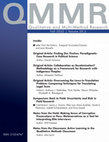
Qualitative and Multi-Method Research, 2022
W e couldn't be more excited to see this issue out in the world. This is our first one as solo ed... more W e couldn't be more excited to see this issue out in the world. This is our first one as solo editors of QMMR. We would like to pay tribute to our predecessor, Jennifer Cyr, who did a terrific job steering the ship and helping us with the transition. Our goal is to build on her work, making QMMR a diverse venue where junior and senior scholars from all corners of the globe come together to share cutting-edge methodological developments as well as their experiences as teachers and practitioners of qualitative and mixed methods research. We envision a publication that is radically practitioner-orientated at its core, one that makes epistemological and methodological discussions accessible, appealing, and useful for the thousands of scholars who rely on qualitative and mixed methods. The contributions to the current issue are in line with this goal. In the pages below, readers will find three original articles. First, Daniel Solomon, a Ph.D. candidate at Georgetown, explains the meaning and significance of "paradigmatic cases." In his view, researchers should employ this terminology only when their cases underminenot affirm-the core assumptions and empirical research standards of social science programs. Second, in an effort to decolonize research design, Mneesha Gellman proposes an innovative collaborative methodology for engaging stakeholders. Specifically, she draws on years of experience conducting fieldwork among indigenous peoples in Northern California and Oaxaca to outline the contours of this approach and alert us of its challenges. Third, Anthony DeMattee, Nick Gertler, Takumi Shibaike, and Elizabeth A. Bloodgood provide excellent advice for scholars who rely on legal texts such as statutes and regulatory rules as primary sources. They argue that those working with documents in multiple languages may occasionally get "lost in translation." This is because available strategies to translate legal texts are either cost-prohibitive or error-prone. Based on available software, the article evaluates several solutions to the "laws-in-translation problem." The issue also features a timely symposium on fieldwork in post-pandemic times. It reflects on the ethical and practical lessons learned by a group of researchers who conducted qualitative research during Covid. The essays discuss the extent to which the adaptations most of us had to make during that period should continue in our new era. In other words, what did we learn about fieldwork safety during an unusually uncertain and difficult period that may also apply to fieldwork more generally? This is an important question that underscores the fact that issues of fieldwork safety and ethics should never take the backseat, even when we collectively lower the guard. This symposium is a great follow-up to the contributors' recently published volume, Safer Field Research in the Social Sciences: A Guide to Human and Digital Security in Hostile Environments (SAGE, 2020). As part of our effort to draw practitioners and teachers into the QMMR community, and thus serve a broader audience, we inaugurate two new sections. In addition to original articles and multi-author symposia, from now on each issue will include Notes from the Field and Notes from the Classroom. In Notes from the Field, we want to hear from graduate students and established researchers who are currently in the field or have recently completed rounds of fieldwork. The essays will consist of vivid reflections APSA-QMMR Section Officers
CeMeCA’s Regional Expert Paper Series, 2022
This paper examines the current democratic breakdown in El Salvador, identifying factors and even... more This paper examines the current democratic breakdown in El Salvador, identifying factors and events in the country from 2019 to 2022 that have led to democratic backsliding, the process by which democracy as a political system loses traction. Indicators of backsliding show that El Salvador's shared characteristics of liberal democracy-free and fair electoral procedures accessible to all; freedoms of the press, to assembly, and to express political opinions; the rule of law; and basic human rights protections-are in peril. Given the events of the last several years under President Nayib Bukele, El Salvador's regime more closely resembles democratic failure facilitated by populist authoritarianism rather than one of democratizing momentum that it embodied in the first part of the twenty-first century.
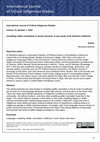
International Journal of Critical Indigenous Studies, 2022
This article examines two case studies of unsettling settler colonialism in the far north of Cali... more This article examines two case studies of unsettling settler colonialism in the far north of California: the inclusion of Yurok language electives in public high schools, and land return to the Wiyot Tribe. These two cases demonstrate repertoires of Indigenous resistance to historic and ongoing culturecide—the killing of culture—and show what unsettling settler colonialism looks like in the region. The central research question in this article is: How does unsettling happen in settler colonial-controlled public institutionalised spaces in far northern California? I argue that acts of Indigenous voice-raising and place-making constitute forms of resistance to ongoing erasure of Indigenous peoples in settler-colonised spaces. Concretely, both Yurok language course inclusion in public schools and land return of Duluwat Island to the Wiyot Tribe disrupt patterns of culturecide and promote new kinds of settler-Indigenous relations in the region.
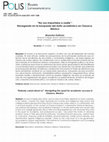
Polis: Revista Latinoamericana, 2021
Access to higher education, and success once there, depends on many variables. In this article, I... more Access to higher education, and success once there, depends on many variables. In this article, I unpack the major obstacles low income and indigenous high school and college students perceive that they face in Oaxaca de Juárez, Mexico. In combination with a structural analysis of the context of Oaxaca based in comparative historical literature, I use political ethnography and qualitative interviews to situate testimonies from recent high school and college graduates about their schooling experiences and obstacles they face in the quest for academic and professional success. I document the matrix of obstacles students name in their educational pathways, including financial resources, mental health, motivation, Oaxacan political instability, physical insecurity, hostile school climates, and discrimination against indigenous people. I draw on the case study of a non-governmental academic support organization, the Institute for Community Integration and Counseling (IIAC), based in Oaxaca de Juárez, Mexico.
Political Science and Politics , 2021
PS: Political Science and Politics, 2021
In 2016, when I first proposed partnering with a Native American tribe in Northern California to ... more In 2016, when I first proposed partnering with a Native American tribe in Northern California to explore questions about youth identity and heritage language access in nearby public high schools, the skepticism from tribal leaders was both palpable and understandable. Why would they spend their limited time dealing with me, an academic, like so many before who

African Journal of Political Science and International Relations, 2020
This article addresses the question, how does Sierra Leone's language regime, moderated through f... more This article addresses the question, how does Sierra Leone's language regime, moderated through formal and informal education, contribute to postwar globalization dynamics? Since Sierra Leonean independence from Britain in 1961, Krio, a type of Creole, has gone from being the mother tongue of a small ethnic minority to the lingua franca, particularly in Freetown, the state capital. English has been Sierra Leone's elite language since colonial times and remains the only official language of government. Yet many other languages are spoken in Sierra Leone in different communities and contexts. Drawing on interviews and political ethnographic work in Freetown and the districts, the study argues that language and identity shift connected to postwar globalization reflects tensions between upward socioeconomic mobility and cultural survival.
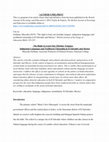
British Journal of Sociology of Education, 2019
This article critically examines bilingual, intercultural education policies and practices in El ... more This article critically examines bilingual, intercultural education policies and practices in El Salvador and Mexico. In the context of legacies of assimilation and neoliberal homogenization, certain kinds of citizenship become prioritized over others. This is visible where performances of local identity clash with state mandates about educational content and the language of school instruction. I address the effects of state agendas in schools on the politics of multiculturalism and argue that the absence of state commitment to bilingual, intercultural education undermines democratization efforts by marginalizing certain types of citizens more than others. By considering ethnic minority education in both El Salvador and Mexico, I analyze in comparative perspective the ways that indigenous people have been rendered invisible as citizens unless they are willing to assimilate in the arena of formal education.
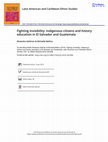
Latin American and Caribbean Ethnic Studies Journal, 2019
El Salvador and Guatemala underwent civil wars that severely impacted both countries’ most margin... more El Salvador and Guatemala underwent civil wars that severely impacted both countries’ most marginalized citizens, including indigenous peoples. Today, teaching and learning the violent past remain challenged in each country, with implications for indigenous and non-indigenous citizens alike. This article examines the impact of democratization in El Salvador and Guatemala in the educational sphere, documenting narrative trends on the topic of the civil wars and indigeneity in formal and informal education settings. We argue that distinct democratization and transitional justice processes have created opportunities and challenges for teaching and learning about indigenous peoples’ roles and experiences in the civil wars in each country. Methodologically, the article draws on analyses of educational policy and formal curriculum in both contexts, supplemented by ethnographic data. We situate the study within democratization, transitional justice, and education literatures to document how teaching and learning the violent past is a highly politicized act with long-term implications for democratic quality in each country.

Third World Quarterly, 2015
This article addresses the divergent cultures of silence and memorialisation about the civil wars... more This article addresses the divergent cultures of silence and memorialisation about the civil wars in Sierra Leone and El Salvador, and examines the role that sites of remembering and forgetting play in crafting post-war citizens. In the formal education sector the ministries of education in each country have taken different approaches to teaching the history of the war, with Sierra Leone emphasising forgetting and El Salvador geared towards remembering war history. In both countries nongovernmental actors, particularly peace museums, are filling the memory gap. Drawing on ethnographic fieldwork in each country, the article documents how the culture of silence that pervades Sierra Leone enables a progress-driven ‘looking forward’ without teaching the past, while El Salvador is working on weaving a culture of memorialisation into its democratisation process. The article argues that knowledge about civil war history can raise young people’s awareness of the consequences of violence and promote civic engagement in its deterrence.

Democratization, 2012
In this article I ask the question: how do citizens use memories of violence in dialogue with a d... more In this article I ask the question: how do citizens use memories of violence in dialogue with a democratizing Turkish state? To address this, I unpack how memories of violence influence solidarity communities in addition to those who are direct descendents of survivors. I also examine how these solidarity communities are widening political space for contemporary dialogue about the Armenian Catastrophe. To demonstrate the connection between memory and political participation, I identify three discursive moments where Turkish and Armenian citizens invoke memory in dialogue with one other and with the state. I use the 2009 online campaign for a Turkish apology to address the Armenian Catastrophe, the aftermath of the murder of Hrant Dink in 2007, and a controversial 2005 academic conference on the events of 1915 as focal points to discuss how memory impacts the way people behave as citizens. My argument is twofold: first, elite-led solidarity networks play an integral role in shaping the discursive space between citizens, the state, and the international community; and second, dialogue about memory can grow space for citizen participation in Turkey.

Development in Practice , 2010
This article explores post-conflict reconstruction in Cambodia through an analysis of both the da... more This article explores post-conflict reconstruction in Cambodia through an analysis of both the dangers of liberal peace building and the positive role that training in capacity building plays in war-torn societies. The central question addressed is how insider-outsider dynamics influence Cambodia's post-conflict reconstruction projects; and what assumptions do international workers and Cambodian NGO staff make about 'the good life' that will be constructed? The article offers an overview of Cambodia's history and cultural context to situate its analysis of liberal peace building and foreign donors, as well as the behavioural characteristics of international peace builders operating within Cambodia. It assesses the potency of elite capture of insider-outsider partnership, specific NGO management practices, and the role of gender to better illuminate the challenges for post-conflict reconstruction. The article concludes with recommendations for improving future partnerships between insiders and outsiders in Cambodian peace-building projects.
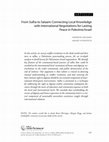
Conflict Resolution Quarterly, 2008
In this article, we survey conflict resolution in the Arab world and then turn to sulha, a Palest... more In this article, we survey conflict resolution in the Arab world and then turn to sulha, a Palestinian peacemaking process, for an in-depth analysis to distill lessons for Palestinian-Israeli negotiations. We identify key features of the community-based practice of sulha that could be invoked at the international level: restoration of honor and dignity, reconciliation in the wider community, and public demarcation of the end of violence. Our argument is that culture is crucial in fostering mutual understanding in conflict resolution, and that ensuring the basic human right to dignity should be an essential component of international third-party interventions. Sulha is promoted as a technique for addressing the right to dignity within contentious multiparty discourse through the tactic of education and community exposure at both the local and international levels. We conclude that reembedding the essence of dignity and honor expression at the community level is a critical component of sustainable nonviolent coexistence sought through international relations.
Asian Perspective, 2008
The Khmer Rouge Tribunal is expected by many in the international community to bring a sense of r... more The Khmer Rouge Tribunal is expected by many in the international community to bring a sense of reconciliation to a nation still grappling with the aftermath of more than thirty years of civil war. Yet the gap between national and local rec-onciliation initiatives tests post-conflict ...
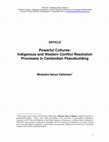
Peace, Conflict and Development, 2007
In this essay I explore the role of cultural differences and disparities in power in western and ... more In this essay I explore the role of cultural differences and disparities in power in western and indigenous mediation and cross cultural conflict resolution processes. I unpack several complex key terms such as mediation, culture, conflict, and power to make their role in conflict visible. Conflict resolution literature serves as my foundation for offering insights about the nature of culture and power, and the way these elements are operationalised in the practice of mediation.
This paper draws on recent fieldwork in Cambodia in order to identify the challenges of praxis as a conflict resolution practitioner in an intercultural work environment. Specifically, I look at the dynamics of western and indigenous cultures in mediation trainings where western epistemologies are prioritised. This paper concludes with suggestions for eliciting organic and culturally based styles of conflict resolution in Cambodia.
Books by Mneesha Gellman
University of Pennsylvania Press, 2023
Brandeis University Press, 2022

Routledge, 2016
Ethnic minority communities make claims for cultural rights from states in different ways dependi... more Ethnic minority communities make claims for cultural rights from states in different ways depending on how governments include them in policies and practices of accommodation or assimilation. However, institutional explanations don’t tell the whole story, as individuals and communities also protest, using emotionally compelling narratives about past wrongs to justify their claims for new rights protections. Democratization and Memories of Violence: Ethnic minority rights movements in Mexico, Turkey, and El Salvador examines how ethnic minority communities use memories of state and paramilitary violence to shame states into cooperating with minority cultural agendas such as the right to mother tongue education. Shaming and claiming is a social movement tactic that binds historic violence to contemporary citizenship. Combining theory with empirics, the book accounts for how democratization shapes citizen experiences of interest representation and how memorialization processes challenge state regimes of forgetting at local, state, and international levels. Democratization and Memories of Violence draws on six case studies in Mexico, Turkey, and El Salvador to show how memory-based narratives serve as emotionally salient leverage for marginalized communities to facilitate state consideration of minority rights agendas. This book will be of interest to postgraduates and researchers in comparative politics, development studies, sociology, international studies, peace and conflict studies and area studies.
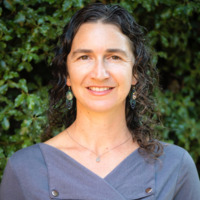


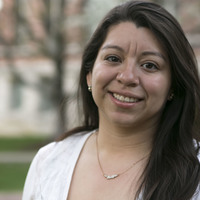

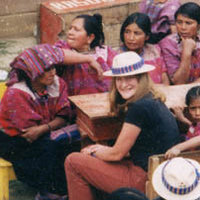

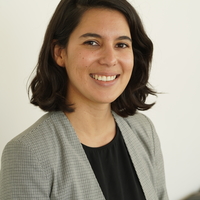



Uploads
Papers by Mneesha Gellman
This paper draws on recent fieldwork in Cambodia in order to identify the challenges of praxis as a conflict resolution practitioner in an intercultural work environment. Specifically, I look at the dynamics of western and indigenous cultures in mediation trainings where western epistemologies are prioritised. This paper concludes with suggestions for eliciting organic and culturally based styles of conflict resolution in Cambodia.
Books by Mneesha Gellman
This paper draws on recent fieldwork in Cambodia in order to identify the challenges of praxis as a conflict resolution practitioner in an intercultural work environment. Specifically, I look at the dynamics of western and indigenous cultures in mediation trainings where western epistemologies are prioritised. This paper concludes with suggestions for eliciting organic and culturally based styles of conflict resolution in Cambodia.
Showcasing young people’s voices, and those of their teachers and community members, in the fight for culturally relevant curricula and educational success, Gellman demonstrates how the Indigenous language classroom enables students to understand, articulate, and resist the systemic erasure and destruction of their culture embedded in state agendas and educational curricula. Access to Indigenous language education, she shows, has positive effects not only for Indigenous students, but for their non-Indigenous peers as well, enabling them to become allies in the struggle for Indigenous cultural survival. Through collaborative methodology that engages in research with, not on, Indigenous communities, Indigenous Language Politics in the Schoolroom explores what it means to be young, Indigenous, and working for social change in the twenty-first century.